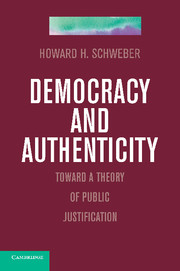Book contents
- Frontmatter
- Contents
- 1 Introduction
- Part One The Case for Constraint
- Part Two Responding to the Case for Inclusion
- 7 Arguments from Consequences
- 8 Further Arguments from Consequences
- 9 Fairness as Equality
- 10 Fairness as Recognition
- 11 The Argument from Epistemology
- 12 Empiricism and Public Justification
- 13 Toward a Theory of Public Justification
- Bibliography
- Index
- References
10 - Fairness as Recognition
from Part Two - Responding to the Case for Inclusion
Published online by Cambridge University Press: 05 November 2011
- Frontmatter
- Contents
- 1 Introduction
- Part One The Case for Constraint
- Part Two Responding to the Case for Inclusion
- 7 Arguments from Consequences
- 8 Further Arguments from Consequences
- 9 Fairness as Equality
- 10 Fairness as Recognition
- 11 The Argument from Epistemology
- 12 Empiricism and Public Justification
- 13 Toward a Theory of Public Justification
- Bibliography
- Index
- References
Summary
In rejecting a balancing-of-unfairness approach to the problem of public reason, I suggested that one difficulty lies in finding a suitably objective standard from which such a balance can be struck that is itself defensible in publicly accessible terms. Charles Taylor argues that there is precisely such an available vocabulary: in his words, “you can argue in reason” about the ideals of authentic self-fulfillment and the requirements of a “politics of recognition” (Taylor, 1994: 23). There are several pieces to this argument. First, there is an argument from fairness that to be denied the recognition that one is due is a denial of respect that breaches the fundamental requirements of fairness and equality in a way that being subject to a merely “unjust” law does not. At the same time, there is an implicit argument from consequences. The terms of this latter argument are somewhat unclear, but Taylor appears to be arguing that what he calls a “politics of difference” provides a basis for unity across difference and thus a response to the problem of pluralism that is more in accord with the demands of fundamental fairness and equality than the theory of public justification.
The idea that recognition is essential to certain conceptions of political equality is not new. Isaiah Berlin identified the desire for recognition as a signature example of positive liberty:
The lack of freedom about which men or groups complain amounts, as often as not, to the lack of proper recognition.…What I may seek to avoid is simply being ignored, or patronized, or despised, or being taken too much for granted – in short, not being treated as an individual, having my uniqueness insufficiently recognized.…And what is true of the individual is true of groups, social, political, economic, religious.…What they want, as often as not, is simply recognition (of their class or nation, or color or race) as an independent source of human activity, as an entity with a will of its own, intending to act in accordance with it.
- Type
- Chapter
- Information
- Democracy and AuthenticityToward a Theory of Public Justification, pp. 301 - 327Publisher: Cambridge University PressPrint publication year: 2011



